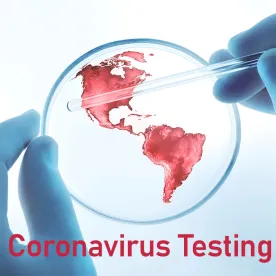Responding to increased public and congressional criticism of its arguably too-flexible approach to regulatory oversight of serological tests used to detect COVID-19 antibodies, on May 4, 2020, the Food and Drug Administration (FDA) announced a revised policy aimed at reducing the risks associated with such tests.
Setting Sail
As we described in our recent post titled “COVID-19 and Lab Testing: What’s the Story Behind the Story?”, in mid-March the FDA announced that it would not require Emergency Use Authorizations (EUAs) for antibody tests because “serology tests are less complex than molecular tests.” FDA also required that manufacturers of such tests state clearly in the rest report that “results from antibody testing should not be used as the sole basis to diagnose or exclude SARS-CoV-2 infection or to inform infection status.”
Nevertheless, in the seven weeks since that announcement, tests of questionable quality have flooded the U.S. market, which led to public health officials, state executives, lawmakers, and others raising concerns about FDA’s decision not to review the scientific data underlying such products. As early as the first week of April, FDA Commissioner Stephen Hahn was among those warning about fraudulent tests, or at least tests being marketed with fraudulent claims. For example, in this April 7 statement, Dr. Hahn noted that “some firms are falsely claiming that their serological tests are FDA approved or authorized, or falsely claiming that they can diagnose COVID-19.” That message was reiterated in an April 18 update from Commissioner Hahn in which he reported that FDA, the National Cancer Institute (NCI), the National Institute of Allergy and Infectious Diseases (NIAID), and the CDC had begun working together to evaluate the performance of antibody tests on the market.
Soon afterwards, on April 28, FDA issued an “umbrella” EUA that covers “SARS-CoV-2 Antibody Tests (Lateral flow or Enzyme-linked immunosorbent assay (ELISA) tests) that have been evaluated in an independent validation study performed” by the NCI or by another government agency designated by FDA. For a test to be authorized for marketing under this serology umbrella EUA, the test must meet all criteria set forth in the Letter of Authorization and must be listed in Appendix A to the EUA. FDA stated that it would add tests to the list after the agency has confirmed that those criteria have been met.
FDA’s early flexibility with respect to serological tests—that is, allowing more tests on the market without premarket review—is widely seen as an overcorrection to the federal government’s much-criticized earlier handling of COVID-19 testing, including the test developed by the Centers for Disease Control and Prevention (CDC) that proved unreliable.
Changing Tides Lead to Course Correction
In the FDA’s announcement of the revised policy for serology tests on May 4, 2020, Deputy Commissioner for Medical and Scientific Affairs Anand Shah and Center for Devices and Radiological Health (CDRH) Director Jeff Shuren first defended the FDA’s original policy, stating, “The flexibility in our March 16 policy allowed for early use of antibody tests to begin to answer critical population-level questions about the prevalence of COVID-19 infections in different communities, and whether the presence of antibodies conveys immunity, and, if so, for how long. Early availability of serology tests has helped generate important information that can inform the future use of serology tests.” They then explained that even though serological test manufacturers were not required by FDA policy to seek an EUA under that March 16 policy, “To date, 12 antibody tests have been authorized under an individual EUA, most within just the past few days, and over 200 antibody tests are currently the subject of a pre-EUA or EUA review [by the FDA].”
In light of widespread reports of tests of dubious quality, it is hard to imagine how inaccurate tests being distributed by bad actors could provide reliable answers to any questions about prevalence or immunity. Even communities relying in part on accurate tests (e.g., those with an authorized EUA) and in part on inaccurate tests would be challenged to have valid information on which to base public health and public policy decisions.
Nevertheless, Drs. Shah and Shuren explained that, “based on real-world experience and data” including the agency’s EUA review of more antibody tests, “the careful balancing of risks and benefits has shifted from where it was in mid-March,” and changes are necessary. FDA has therefore revised the March 16 policy to now require commercial developers of antibody tests to submit EUA requests to the agency, along with the supporting validation data, no later than 10 business days after their notification to FDA that validation has been completed and that the test is being distributed. Significantly, the revised policy also requires that commercial developers of tests that had been previously validated and distributed but for which an EUA had not been submitted to now make such submission to FDA no later than May 18, 2020.
FDA plans to issue a public update soon after the May 18 deadline, which will include information about “particular commercial manufacturers that are currently marketing tests under [the] March 16 policy [that] fail to submit an EUA” to “encourage states, hospitals and consumers to be on high alert and to make informed purchasing decisions regarding these tests.” We will carefully review this FDA announcement and will monitor whether the agency takes specific enforcement actions to remove non-compliant or unvalidated tests from the market. Although Drs. Shah and Shuren only mentioned the possibility of “detaining and refusing illegitimate test kits at the border,” there is no reason that domestic firms would not be subject to administrative or judicial enforcement action if the government has concerns about public health and unlawfully marketed products.
It is critical to emphasize that FDA’s articulated concerns about problematic antibody tests are strongly centered on commercial test kit manufacturers and not on high-complexity clinical laboratories regulated by the Centers for Medicare and Medicaid Services (under the law known as CLIA; see our prior post for more detail). The revised policy does not alter the original requirements for CLIA-certified high-complexity labs that develop and validate their own COVID-19 antibody laboratory developed tests (LDTs). This means that LDT developers are not required to submit EUAs after launching their serological tests, although they still may do so voluntarily.
Finally, FDA took steps to simplify the EUA process for all antibody test developers, including providing specific performance threshold recommendations for specificity and sensitivity and making available voluntary EUA templates for both commercial manufacturers to use in their now-mandatory EUA requests and CLIA-certified high-complexity labs to use in their optional EUA requests.
The revised FDA policy for serological tests can be found in Section IV.D of this guidance document. The agency has also updated all of the FAQs on serological tests on its SARS-CoV-2 informational website for test developers (both kit manufacturers and clinical labs).
The policy changes are intended to help ensure smooth sailing for testing going forward. We will be following additional agency actions closely and will provide an update after the May 18 deadline as events and conditions warrant.





 />i
/>i

